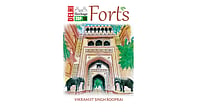Achallenged baby and his harassed mother find escape in the snows of Nepal, along with his little brother. Jane Howarth-Wilson’s book is a travelogue with a distinct difference. There are very few mothers from the West who would consider taking a baby with a hole in its heart and innumerable other problems to a remote valley in Nepal, but Wilson-Howarth, despite everyone’s warnings, looked on it as a merciful release from the cold inhumanity of the United Kingdom medical system—made more ironic by the fact that she herself was a trained healthcare professional. Simon, her husband, was based on Rajapur island with a two-year irrigation project.
The book is a description of a life that becomes idyllic despite her worries about David the baby. Wilson-Howarth and her older son Alexander learn to cope with hairy caterpillars and hole-in-the-ground toilets, not to mention the local population who, while of course loving babies, have their own peculiarities. The weather is Nepal is very different from clammy, foggy England, and she goes on long treks with her husband and children, not to mention elephant rides in the national parks, where they come across tigers.
She does, as is expected, notice the dirt, the lack of hygiene and the poverty, but the flame of the forest blazes brighter than all that, setting her firmly apart from many expats who treat their Third World experiences as a kind of slum tourism. The stories of Nepali ghosts distract her and Alexander is quite happy playing with the children and occasionally bossing them or amusing his brother.
Imperceptibly, Baby David begins to improve, the hole in his heart heals and Wilson-Howarth has more time to take in the oddities of Nepali society. She learns the language but does, occasionally, have difficulty in distinguishing between Nepali and Hindi—as in her list of Nepali words which have entered the English language. Her medical training is acknowledged by the local people who come to ask her advice but refuse to listen to whatever she has to say, since all they want is a confirmation that they are taking the right medicine.
The book could have been a sentimental one, but Wilson-Howarth looks life squarely in the eye. She does not pity herself or David, determined to make the best of things and when she looks around her, she finds the Nepalis equally accepting of fate and its vagaries. Unlike the English, they coo over David’s white skin and blue eyes, ignoring the fact that his head is too large or that he carries the scar from a harelip.
Wilson-Howarth courageously embarks on a third baby, another boy, but little Sebastian, apart from having the blankets tugged off him by a jealous David, vanishes in the descriptions of chaos and colour in Nepal. Wilson-Howarth keeps the reader guessing as to David’s fate, so the reader wanders down mountain trails with her, hoping against hope, though an injudiciously placed photograph gives the sad story away in the middle of the book. For Wilson-Howarth, Nepal remains a spiritual haven and a zoological treasure trove, a place where the souls of children released from their troubled bodies can play with the thunderclouds for all eternity.


























